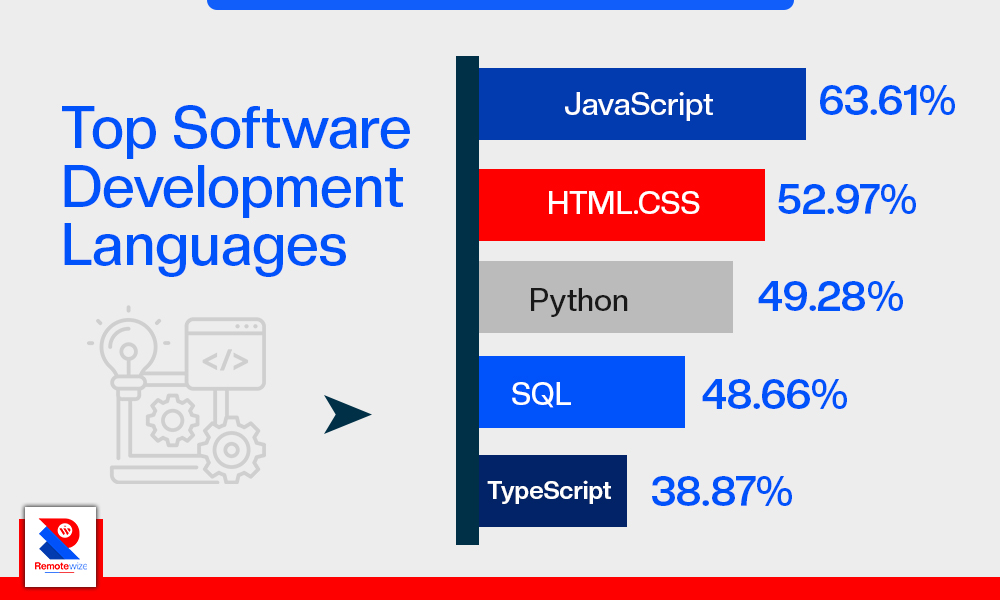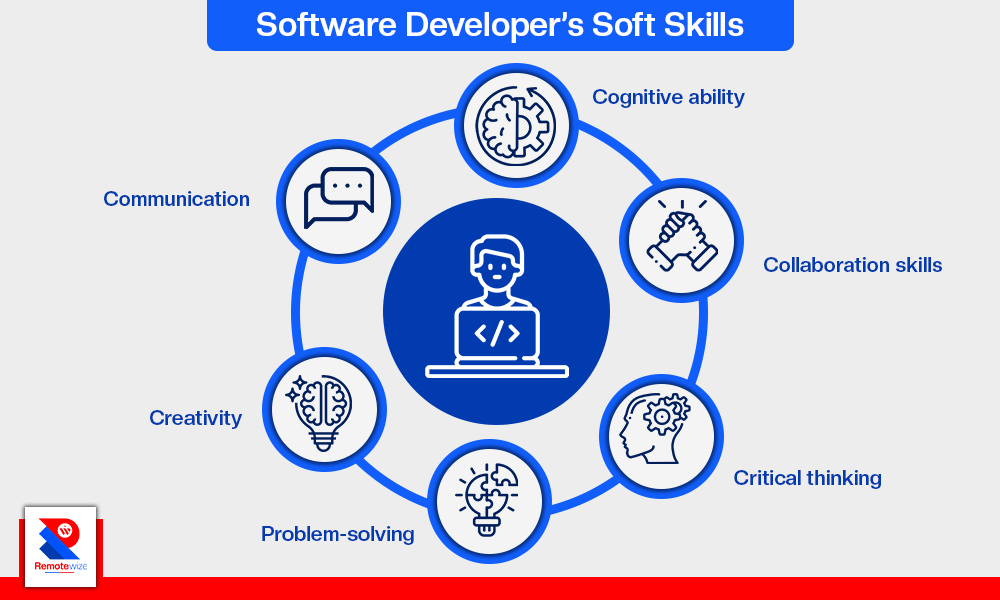
Software developers contribute greatly to a company’s growth by operating the main engine room of any organization’s software department. Whether you’re a startup aiming to disrupt the industry or an established organization looking to stay ahead of the competition, hiring top software developers is important.
However, with multiple programming languages, frameworks, and countless technologies, choosing one or a few developers from the stacks of applications can be challenging. Moreover, there are projected to be an average of 162,900 job openings yearly for software developers, testers, and quality assurance analysts. This is mainly credited to workers exiting the workforce or moving jobs and indicates the recruitment process will be an ongoing endeavor.
So what key skills for software engineers should you be looking for? This blog post will take you through the essential skills to be keen on to assemble a talented and dynamic team that can move your business forward.
Software Engineering Programming Languages & Skills

Every programming language has merits and specializations that allow software engineers to tackle multiple projects and tasks. As the founder of a startup or bootstrapped company, your goals and objectives will determine your choice of programming skills in potential candidates. Here is an overview of some popular programming languages necessary when recruiting developers:
1. Java
Java is a universal programming language that is commonly used in software development. It’s statistically typed, making it an excellent option to catch errors. It is quite reliable and is used extensively in enterprise applications.
Moreover, it’s versatile, making it a go-to language for building web-based services, embedding complex software systems, and creating desktop and mobile applications. Java enables programmers to inherit behaviors and attributes from classes without recreating them because it has fewer dependencies.
2. JavaScript
JavaScript is an interpreted programming language mainly used in developing web applications, building games, and adding interactive features to websites. Software engineers can use it for scripting since an existing system interprets its code.
It has first-class functions, a dynamic type system, and is single-threaded. This functional programming language is applicable in both front-end and back-end development. It can also be used in network applications and outside a web browser. As of 2022, 98.7% of websites globally utilize JavaScript as a client-side programming language, demonstrating the language’s growing popularity.
3. Swift
Swift is a programming language developed for iOS, watchOS, macOS, Linux, and tvOS applications. It was developed by Apple Inc, which makes it the primary language for iOS development.
Swift aggregates the best of Objective-C and C, excluding compatibility limitations. Developers can use Swift to write concise and safe code for operating systems like Linux and Windows. It is also relatively easier to use compared to older languages.
4. Scala
Scala is a multi-paradigm programming language created by Martin Odersky. This programming language is meant to convey common programming patterns safely and concisely. Developers can use it to combine functional and object-oriented languages seamlessly. Both Java and Scala are JVM-based languages, and Scala generates the same byte code as Java.
5. SQL
SQL in full is Structured Query Language, a language used to manage data in relational databases. It is a declarative language, which means that it states the expected outcomes of a query without identifying the actions required to achieve those outcomes.
SQL enables programmers to store, manipulate, manage, and retrieve data in data management systems. It is especially useful in data analytics applications. Statistica states SQL was the third-most-popular programming language among software developers at 49.43%.
Software Engineering Technical Skills
Software engineers require technical skills to create reliable, efficient, and scalable software solutions. Here are some essential key technical skills needed for software engineers:
6. Software architecture
Software architecture refers to the process of designing and structuring a system. It involves making decisions about all included elements, such as layers and modules. It also involves determining how these elements and other components interact.
This skill is necessary because it determines the structure of software and ensures that it is scalable, maintainable, and adaptable. Software architecture guarantees that each software solution has a solid foundation for development.
7. Software Development
The software development process is at the heart of every software engineer’s skillset. It involves building a software application, from its conceptualization to its implementation (the software development life cycle). Software development skills enable programmers to build frameworks and methodologies that meet project requirements and result in functional software solutions.
8. Coding and Computer Programming
Among software engineers’ most fundamental technical skills, coding skills, and computer programming are top of the list. Every good software engineer must be competent in at least one coding language based on your organization’s needs. A computer science degree and software engineering courses are a plus.
Proficiency in coding enables engineers to translate requirements and algorithms into executable instructions that a computer system can understand. This is fundamental when creating valuable software applications.
Some coding languages are better suited for some software engineering jobs than others. For example, Java would be the best option for a company developing Android apps, while Swift would be ideal for iOS applications.
9. Software Testing
Before software applications are launched, software engineers need to certify that they are reliable and defect-free. This is done through software testing, where any defects and bugs are identified and eliminated. Skills and techniques required for this process include integration, system, and unit testing. Engineers will also need to comprehend test-driven development methodologies to be efficient in testing. As per Global Market Insights, the software testing market is expected to grow at a 5% CAGR between 2023 and 2032.
10. Object-Oriented Design (OOD)
Object-oriented design refers to designing and organizing software systems based on their components and interactions. Successful software engineers need to be proficient with OOD to promote modular, maintainable, and reusable code. OOD engineering principles such as polymorphism, inheritance, and encapsulation enable engineers to create software architectures that are easy to understand and flexible.
11. Data Structure and Algorithms
Other vital skills include data structures and algorithms. These are crucial skills for building efficient software solutions. Data structures cover the different ways organizations store their information in databases. Algorithms, on the other hand, are the procedures necessary to undertake a task.
Software engineers need these technical skills to evaluate which combinations of data structures and algorithms will assist them in maximizing the information in a program’s code. These top software engineer skills also enable proficiency in solving computational problems, especially when handling growing data volumes.
Software Engineer Soft Skills

Although technical skills and knowledge of various programming languages are invaluable in entry-level software engineers, they also need soft skills to complement them. Here are some key soft skills they should possess:
12. Problem Solving
Before a software development project is accomplished, different complex challenges are encountered regularly. Developers, therefore, require strong problem-solving skills that enable them to think critically, identify patterns, and approach problems systematically. This critical skill enables them to anticipate problems before they happen, providing solutions to mitigate setbacks or hurdles.
“Software developers must have the ability to think critically and creatively in order to solve complex problems. They should also have good problem-solving skills, as they will be tasked with debugging programs and finding solutions to any issues that arise. In addition, software developers need to be able to collaborate effectively with their team members in order to come up with innovative solutions.”
~ Martin Seeley. Founder & CEO at Mattress Next Day
13. Attention To Detail
Software engineers work with intricate code structures, so it is unsurprising that attention to detail is an essential soft skill. The code must be clean and error-free for all software components to work harmoniously. Attention to detail helps software engineers review their code and spot errors or inconsistencies. It helps in debugging software programs and improving the overall performance of the software.
14. Communication skills
Software engineers seldom work alone. They require input from clients, stakeholders, and other software development team members. This means that developers must be able to express ideas clearly, articulate technical concepts, and explain solutions.
Strong communication skills enable them to understand project needs, ask pertinent questions, and deliver accurate progress reports. Additionally, software engineers who communicate effectively promote a productive workplace by ensuring everyone participating in the software engineering process is on the same page.
“Effective communication becomes even more vital when team members are located in different time zones or working asynchronously. Developers should be able to articulate their ideas clearly, actively participate in discussions, and provide regular updates on their progress. They should also be adept at using collaboration tools and platforms to facilitate effective remote communication.”
~Joe Morgan, CEO and Editor-in-Chief of Venture Smarter
15. Fast Learner
The tech world constantly changes, with new tools and frameworks emerging daily. Software developers must be able to continuously update their skills to help them optimize the final product. They must be eager to learn new things and incorporate emerging technologies and concepts in their everyday work. Continuous learning is, therefore, a necessity in delivering innovative solutions.
16. Team Player
Complex software development projects necessitate the expertise and input of multiple parties, which is why team player skills are key for a successful software engineer. Cross-functional teams involving project managers, designers, stakeholders, and testers contribute to a project. Being a team player allows smooth collaboration where all members share knowledge, provide constructive feedback, and participate in discussions for project success.
“Collaboration is the key in any remote teams. I look for collaboration skills in software developers as much as I would look for technical skills. I need someone who can work well in teams and on projects that involve multiple stakeholders and dependencies. I look for software developers who can coordinate and cooperate with others, share their ideas and feedback, and resolve conflicts and issues.”
~Anna Koval, Co-Founder and Marketing Officer at Tarotoo
Is It Possible to Find Software Engineer With These Skills?
The best-case scenario when recruiting software developers is to find talent with all these skills. However, this is more theoretical than practical, as it’s not possible to find a software developer that ticks every box. It’s important to recognize that software engineering and development is a constantly evolving field, and new technologies and frameworks emerge regularly.
Organizations have to define their goals and objectives, which will guide them to what they require from a developer. Non-negotiable core skills include knowledge of coding and programming languages, as this falls at the heart of the developer’s job.
Other skills can be acquired on the job, and a great way to impart them is by undertaking training programs or providing opportunities for continuous learning and professional development. Select candidates who have a willingness to learn and adapt to new technologies, and you can nurture their skills further.
Conclusion
Hiring a software developer with the right key skills for software engineer is essential to building an innovative tech team that is bound to be successful. Although finding software engineers with all the skills might be a hurdle, you can focus on the core competencies when recruiting and build upon other software engineer skills later.
Software development is a dynamic field, with changes occurring now and then. This means that you need to cultivate and nurture the skills of your developers to ensure they are all-rounded and driving innovation. Ultimately, choose candidates that can collaborate, learn and solve problems for organizational success.
Software Developer Skills: FAQs
Software developers need a mix of programming language knowledge, technical skills, hard and soft skills to be effective. They need to be able to code in at least one language. They should also be analytical, fast learners, team players, and have problem-solving abilities.
The most crucial skill for software engineering experts is programming and coding. Executing most software engineering responsibilities is impossible unless you can write code and develop programs and applications from scratch.

